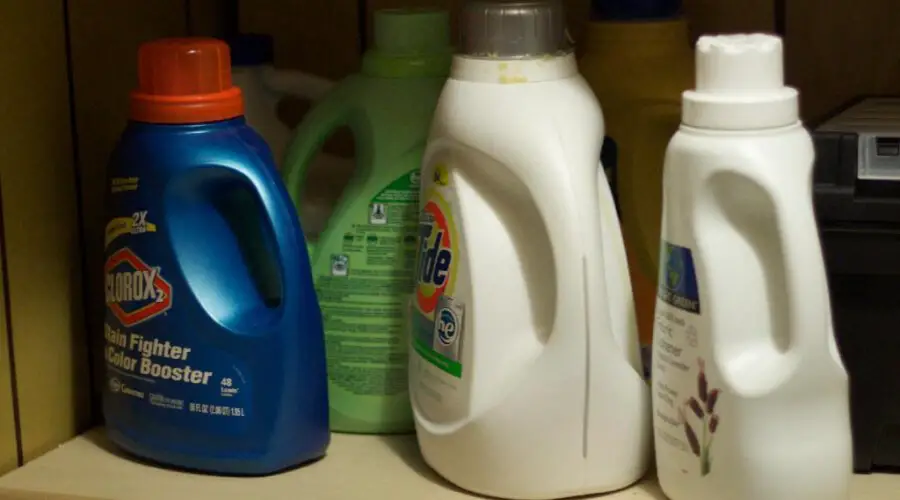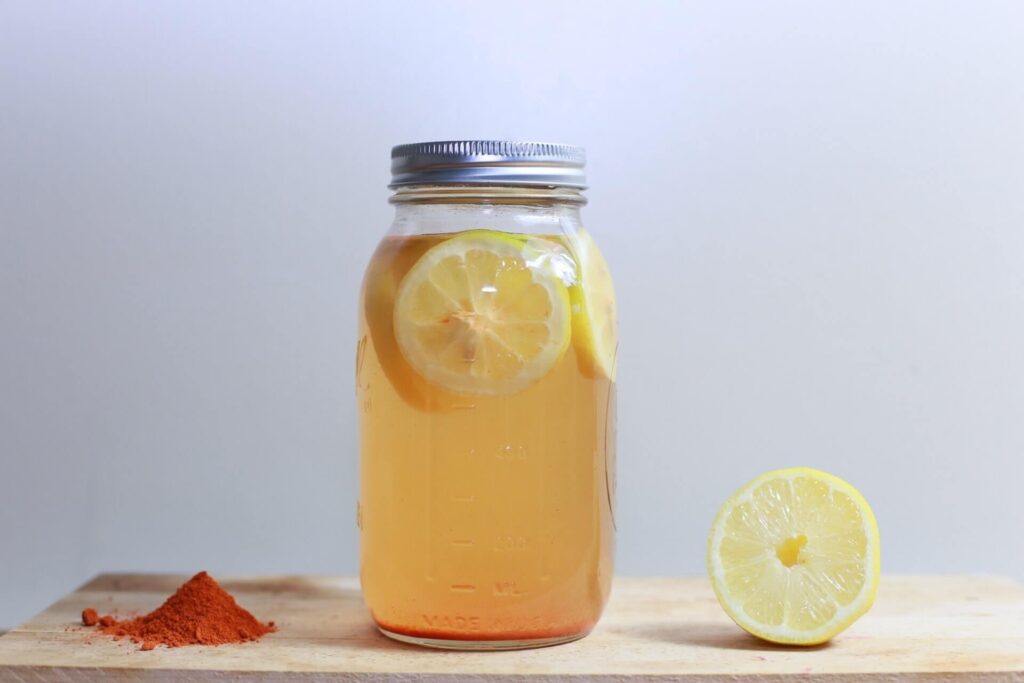Last Updated on July 23, 2023 By Emma W. Thomas
Washing clothes without detergent may not effectively remove dirt, stains, and odors. Detergents are designed to lift and suspend dirt, allowing it to be rinsed away. Without detergent, clothes may remain dirty, and bacteria can thrive, causing unpleasant smells. Detergent enhances the cleaning process for fresher, cleaner garments.
What Happens When You Wash Clothes Without A Detergent?
Washing your clothes without detergent can lead to a range of consequences. These can range from minor issues like a lack of cleanliness to more significant problems such as malfunction of the machine or foul odors. Here’s what you need to know about the repercussions of this habit:
1. The Clothes Might Not Get Clean
The primary purpose of detergent is to remove stains, dirt, and odor from clothing. When laundry is washed without detergent:
- Stains remain: Without the cleaning power of detergent, common stains from foods, oils, or dirt are not dislodged and remain on the fabric.
- Odors persist: Detergent not only cleans but also has a role in removing the odor from clothes. Without it, the unpleasant smell may persist even after washing.
2. Reduced Efficiency of the Washing Machine
The lack of detergent can also affect the machine’s performance:
- Build-up of dirt: Over time, dirt, and grime from your clothes can build up within the machine causing it to work less efficiently than usual.
- Increased wear and tear: The accumulated grime can put more stress on the machine, leading to increased wear and tear over time.
3. Residual body oils and bacteria
Detergents are designed to remove body oils and bacteria. Without it, these unwanted particles will remain:
- Body oils: Oils from your skin can build up on fabric, attracting more dirt and leading to a grimy finish.
- Bacteria and allergens: The high temperature of a washing machine alone may not be enough to kill all bacteria and allergens.
4. Unpleasant Odors
Without detergent, odors can become a serious problem:
- Bad smell: Since dirt, body oils, and bacteria are not fully removed, they can cause an unpleasant smell on clothes after washing.
- Mold and mildew: In some cases, the dampness and lack of adequate cleaning can lead to the growth of mold and mildew.
To summarize, washing clothes without a detergent can lead to a multitude of issues, such as a lack of cleanliness, machine inefficiency, remaining bacteria and body oils, and unpleasant odors. Therefore, it’s best to always use an appropriate amount of detergent while washing clothes. Without it, you may not only risk the integrity of your clothes but also face potential problems with your machine.
How Does Detergent Work on Clothes?
Detergents are indispensable in our daily lives, aiding in maintaining cleanliness and hygiene. Particularly, they play a crucial role in washing clothes by effectively removing dirt and stains. Understanding how detergents work can help users make more informed decisions while choosing the right detergent for their laundry needs.
1. Cleaning Component of Detergents
- The primary ingredient in most detergents is surfactants.
- Surfactants are compounds that lower surface tension between different substances, like oil and water.
- By reducing this tension, surfactants enable water to mix with oil and grease, making them easier to remove during the washing process.
2. Enzymes for Stain Removal
- Detergents contain specific enzymes to break down proteins, fats, and carbohydrates found within stains.
- Enzymes operate as biological catalysts, accelerating the process of breaking down complex stain molecules.
- For instance, protease enzymes are used for breaking down protein-based stains, like blood, while lipases handle fat-based stains.
3. Builders for Water Softening
- Detergents include chemicals known as builders that work by softening water.
- Builders bind the minerals, especially calcium and magnesium ions, present in hard water, enhancing the efficiency of surfactants.
- Softened water allows the detergent to produce a vigorous lather and makes it easier for the surfactants to do their job.
4. Bleach for Color Safety and Brightness
- Many detergents incorporate bleach, ensuring color safety and enhancing brightness.
- Bleach oxidizes organic stain molecules, making them colorless and easier to wash away.
- A gentle amount of bleach is often added to color-safe detergents to enhance cleaning power without damaging the fabric’s color.
5. Fragrance and Brighteners
- Detergents often include fragrances and brighteners.
- Fragrances add a pleasant smell to the clothes after washing.
- Fabric brighteners, also called optical brighteners or fluorescent whitening agents, absorb ultraviolet light and re-emit it as blue light making the clothes appear brighter and cleaner.
How Detergents Work: The Steps
- Firstly, the surfactants reduce surface tension allowing water to penetrate the fabric.
- Once into the fabric, the water dissolves and disperses the dirt and stains.
- The enzymes then come into play, breaking down complex stains into simpler compounds.
- The builders ensure the effectiveness of the surfactants by softening the water.
- Finally, the bleach, fragrances, and brighteners result in clean, fresh-smelling, and bright clothes.
What Are Some Alternatives To Using Detergents For Washing Clothes?

If you want to do some laundry but realize that you have no detergent for this, there are various alternatives that you can use, including;
Bar soap
You can use bar soap as an alternative to detergent when hand-washing a small load of laundry. But, it is better to be sure that the bar soap does not contain oil as this may cause problems with your garments. Bar soap is a good alternative for removing stains but, you can never use it with your washing machines or on large loads of laundry.
Shampoo
Shampoo is one of the main alternatives to laundry detergents but is not suitable for use with the washing machine. This substance has suds that are hard to remove with the normal rinse cycle. It is, therefore, ideal for hand-washing.
It is pretty easy to remove oils and dirt from your fabric using shampoo. Be sure to choose a gentle shampoo over a harsh one. A small amount of this product will be enough for a bathroom sink full of water. If you have a large load of laundry, you can use a more oversized sink or a tub.
Baking Soda
Baking soda is also a great choice when you don’t want to use a detergent, especially removing odors. You may also choose baking soda to make your white clothes brighter, and you can also add some to your washing machine if you aren’t comfortable with hand washing.
When washing towels or white clothes, you can choose to combine the product with a bit of bleach. Doing this gives you a powerful combination that will get rid of stains quickly. Baking soda is an excellent alternative that does not only work well but is also very cost-effective.
Dishwashing Liquid
While a dishwashing liquid can be an excellent option for washing your clothes, one needs to be very cautious when using it. Be sure to use this product when hand-washing your clothes and confirm that it does not contain bleach. Make sure also that you use a little amount at a time.
Borax
Although borax is not commonly available at home, it is another excellent alternative to laundry detergent. This substance is quite efficient when eliminating strong odors from your garments, especially if you have kids who wet their beds. Borax gives your clothes a deep cleaning as you can get with a laundry detergent. You can also use it in softening hard water, making it an excellent product to add to your list.
What Are The Natural Alternatives To Laundry Detergents?

For those people with sensitive skin and who may not wish to use manufactured substances due to the chemicals used, there are natural products including;
White Vinegar
Vinegar is a great alternative to use for your laundry, especially if you have sensitive skin. You can add this product to your washing machine to make your clothes not only brighter but to whiten the whites. Due to its mild acidic nature, vinegar does an excellent job removing stains in both colored and white clothes.
The potent smell of vinegar makes it suitable for use with clothing that may have a sour smell as it perfectly removes it. You can run your laundry through a cycle containing vinegar, and the pungent odors will go.
Lemon Juice

Lemon juice is another natural alternative to laundry detergent, and it is also very efficient. You can use the liquid to remove stains (especially rust stains) and brighten white clothes. If your fabric has mold or mildew stains, lemon juice will come in handy to remove them. You can wash your damp towels and other pieces with a combination of lemon juice and salt, and the mildew problem will be fixed. Prepare an easy-to-spread paste and apply it to the affected area on your curtains, clothing, and any other fabric that have mildew issues.
Why Do Some People Avoid Using Detergents For Their Laundry?
Some people may avoid using detergents, especially those with some skin conditions. One of the main reasons why laundry detergent may not be good include;
Presence Of Harmful Chemicals
Studies have shown that detergents contain some chemicals that can be toxic or hazardous to health. Examples of these chemicals include SLS (Sodium Lauryl Sulfate), Surfactant cleansing agents, foamers, and emulsifiers. This SLS may affect the skin, remove the protective moisture and oils, and irritate the eyes.
About 2/3 of the detergents also contain 1,4-Dioxane, a byproduct of ethoxylate (a softener added to the detergent to produce more suds). 1.4 Dioxane is believed to cause cancer and affect the central nervous system, the brain, the liver, the kidneys, and the respiratory system.
Common Harmful Chemicals In Detergents And Their Effects On Humans
Chemical | Purpose | Effect On Human |
1,4-Dioxane | Used as degreaser and solvent | It is carcinogenic, causes malignant and benign tumors. |
SLS (Sodium Lauryl Sulfate) | It is a foaming agent to make detergents and soaps froth. | It irritates the skin and may cause rosacea, eczema, and psoriasis. |
Formaldehyde | It is an inexpensive antibacterial and preservative agent. | Causes irritation to the lungs, respiratory system, and eyes. It can also cause allergic reactions such as contact dermatitis and eczema. Daily contact with the skin can also cause cancer. |
Bleach | For brightening clothes | Causes allergic reactions and also irritates the lung and eyes. |
Nonylphenol | Disrupts endocrine function by mimicking estrogen. | |
Benzene | It is a surfactant that makes it easy to remove dirt and stains on clothes. | Causes irritation to the skin, eyes, and nose. It is toxic to aquatic life. |
Synthetic fragrances | Make the clothes smell fresh. | They irritate the respiratory system. These substances may also cause asthma. |
Detergents Are Non-biodegradable
Detergents are non-biodegradable, and they end up in the soil and water bodies. Some detergents contain chemicals such as phosphates and nonylphenol ethoxylate, which remain in the soil and ground & surface water for a long time. These chemicals are highly toxic, and they deprive aquatic organisms of oxygen, leading to death.
What Factors Should You Consider When Buying A Laundry Detergent?
Detergents make removing dirt and stains from clothes easy, giving them a clean look and fresh smell. Since there are different detergents in the market, it is necessary to know what to look for in these products to get the best. Some of the main factors to consider include;
Whether To Buy A Liquid Or Powder Detergent
Detergents come in both liquid and powder forms. The choice you make depends on your preferences and also the temperature of the water you usually use. For example, if you love using cold water, a liquid detergent is preferable since it can easily dissolve in water compared to powder detergent. Liquid detergents are also more effective when cleaning delicate fabrics.
Ingredients In The Detergent
Some detergents may contain chemicals that are harmful to your skin and health. Be sure to read the label to establish the constituent elements in the detergent. It is essential to choose eco-friendly detergents since they are harmless to your health and beneficial to the environment.
It is also recommendable to use natural detergents when washing baby clothing to prevent allergic reactions in the babies.
Whether You Are Hand-washing Or Using A Washing Machine
Some detergents are suitable for hand-washing while others are for washing machines. Make sure that before purchasing the detergent, you look for the most appropriate. Putting the wrong product in your washing machine may damage it and reduce its efficiency. You can read the instruction manual of your device to know which products are suitable for them.
Type Of Fabric
You can also choose a detergent depending on the type of fabric you want to clean. Make sure that the detergent you buy does not contain harmful chemicals that can damage your clothes. Natural materials like cotton, silk, and wool may not withstand the harsh chemicals in some detergents.
Color Of The Fabrics
The color of your fabric is another crucial factor to consider when buying a detergent. For white garments look for a product that contains bleach as this will help to brighten the clothes. Conversely, if you want to clean colored fabrics, look for one that includes a brightener instead of bleach to prevent them from fading.
Conclusion
Washing clothes without a detergent may not give them the deep cleaning that you desire. Using only water to clean your fabric will not break up the dirt and oil particles on them as detergent does. However, if you must avoid detergents for whatever reasons, then using natural products such as lemon juice and vinegar can be quite effective. You may also go for alternatives such as bar soap, shampoo, and baking soda but be sure to check which ones are okay for your washing machine.
References:
https://inthewash.co.uk/laundry-and-ironing/wash-clothes-without-detergent/
https://organizing.tv/can-i-do-laundry-without-detergent/
Emma is a graduate of Domestic Science or Family and Consumer Sciences (Home Economics) from the University of Wisconsin. She has 7 years of experience Working with the strategic section of BestBuy and now writing full-time for Homeeon.
From Managing the Home, Interiors, Cleaning, and Exteriors to Gardening and everything about Making A Home Liveable – is her passion and this Homeeon is the result of this.
Emma loves decorating her home with the best stuff found online. She cares about quality over anything and writes reviews about them here in Homeeon. Get in touch with her over Pinterest.
Keep reading her blogs.

